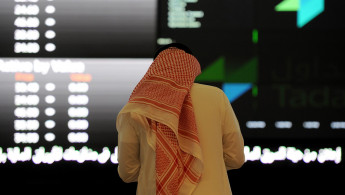Saudi coffers lose $14 billion in one month
Saudi's financial reserves continue to hemorrhage as oil revenues fall, forcing the authorities to tap into sovereign wealth funds and implement austerity to plug the budget deficit.
2 min read
Saudi Arabia's finances have been deeply hurt by falling oil prices [AFP]
The Saudi Arabian Monetary Agency (SAMA), the central bank of the Kingdom of Saudi Arabia, lost $14.6 billion from its reserves in January compared to December, according to its monthly report.
SAMA's investments in securities abroad, which represent nearly two-thirds of its assets, declined in value by 27 percent, according to the report published on its website.
The Saudi sovereign wealth fund has also been bleeding steadily since its value hit a peak of $737 billion in 2014, amid collapsing oil prices that have since slumped by nearly 70 percent.
In July 2015, the declared value of the fund's assets was $661 billion, after the kingdom began to tap into the fund to plug the gap in its growing deficit.
Saudi Arabia faces years of tough austerity as the worst oil price crash in the modern history forces the kingdom to make radical cuts to government largesse, the International Monetary Fund warned recently.
The world's largest producer of crude oil will need to "transform" its economy away from oil revenues, which make up more than 80 percent of the government's wealth, according to Masood Ahmed, head of the Middle East department at the IMF.
The Saudi monarchy has already been forced to unveil a programme of government austerity as oil prices collapsed.
Saudi Arabia has also been leading a costly intervention in Yemen since March 2015 against Houthi rebels and their allies, in support of the internationally recognised government of Abed Rabbo Mansour Hadi.
Saudi spending on defence and security rose by about $5.3 billion in 2015, according to Adel Faqih, minister of economy and planning, and with no end to Yemen's war in sight, Saudi's costly foreign intervention is expected to continue.
SAMA's investments in securities abroad, which represent nearly two-thirds of its assets, declined in value by 27 percent, according to the report published on its website.
The Saudi sovereign wealth fund has also been bleeding steadily since its value hit a peak of $737 billion in 2014, amid collapsing oil prices that have since slumped by nearly 70 percent.
In July 2015, the declared value of the fund's assets was $661 billion, after the kingdom began to tap into the fund to plug the gap in its growing deficit.
Saudi Arabia faces years of tough austerity as the worst oil price crash in the modern history forces the kingdom to make radical cuts to government largesse, the International Monetary Fund warned recently.
 |
In late December, King Salman bin Abdulaziz declared the deficit in the Saudi budget in 2016 would be worth around $87 billion. |  |
The Saudi monarchy has already been forced to unveil a programme of government austerity as oil prices collapsed.
Saudi Arabia has also been leading a costly intervention in Yemen since March 2015 against Houthi rebels and their allies, in support of the internationally recognised government of Abed Rabbo Mansour Hadi.
Saudi spending on defence and security rose by about $5.3 billion in 2015, according to Adel Faqih, minister of economy and planning, and with no end to Yemen's war in sight, Saudi's costly foreign intervention is expected to continue.





 Follow the Middle East's top stories in English at The New Arab on Google News
Follow the Middle East's top stories in English at The New Arab on Google News
![The UAE is widely suspected of arming the RSF militia [Getty]](/sites/default/files/styles/image_330x185/public/2024-11/GettyImages-472529908.jpg?h=69f2b9d0&itok=Yauw3YTG)
![Netanyahu furiously denounced the ICC [Getty]](/sites/default/files/styles/image_330x185/public/2024-11/GettyImages-2169352575.jpg?h=199d8c1f&itok=-vRiruf5)
![Both Hamas and the Palestinian Authority welcomed the ICC arrest warrants [Getty]](/sites/default/files/styles/image_330x185/public/2024-11/GettyImages-2178351173.jpg?h=199d8c1f&itok=TV858iVg)